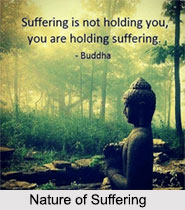 Nature of Suffering has been elaborated by Lord Buddha himself whilst discussing the Four Noble Truths. The First Noble Truth is often translated as “life is sufferingâ€. This is the problem of existence. In Buddhism, the Four Noble Truths are considered as an important principle. The Four Noble Truths were classically taught by Lord Buddha in "Dharmachakra Pravartana Sutra". It is believed that from his spiritual experience, Lord Buddha became convinced that there is suffering, it has a cause, that it can be suppressed and that there is a way to accomplish this.
Nature of Suffering has been elaborated by Lord Buddha himself whilst discussing the Four Noble Truths. The First Noble Truth is often translated as “life is sufferingâ€. This is the problem of existence. In Buddhism, the Four Noble Truths are considered as an important principle. The Four Noble Truths were classically taught by Lord Buddha in "Dharmachakra Pravartana Sutra". It is believed that from his spiritual experience, Lord Buddha became convinced that there is suffering, it has a cause, that it can be suppressed and that there is a way to accomplish this.
Concept of Nature of Suffering
The first of the Four Noble Truths is the tyranny of pain or the nature of suffering. Life is suffering. This is the noble truth concerning suffering - birth is painful, decay is painful, disease is painful, death is painful, union with the unpleasant is painful; painful is the separation from the pleasant, and any craving that is unsatisfied, that too is painful. In brief, the five aggregates which spring from attachment are painful. Insistence on suffering is not unusual to Buddhism and it was also emphasised in its philosophy.
Scholars also suggest that in the whole history of thought, no one has painted the misery of human existence in darker colours and with more feeling than Buddha. The melancholy foreshadowed in the Upanishads occupies the central place here. According to the Buddhist philosophy, even after trying everything that can spread comfort and happiness and suppress all social injustice, yet a man on earth will not attain satisfaction. In the Dhammapada, it is mentioned - "Not in the sky nor in the depths of the ocean, nor having entered the caverns of the mountain, nay such a place is not to be found in the world where a man might dwell without being overpowered by death". The most moral hero and the greatest work of art one day are consumed in death. All things pass away. It furthers states that all the reams and hopes, fears and desires of a person - almost all of them will be forgotten as though they had never been. None can resist the universal supremacy of death. Death is the law of all life.
As per this first Noble Truth, all fulfilment of desire is attended with pain. The misery of human nature, with its eternal longing, which creates wants much in advance of man`s power of satisfying them, cannot but make one feel that life is a curse. Tormented by thought, cheated by chance, defeated by the forces of nature, oppressed by the massive weight of duty, the horror of death, the dread consciousness of coming lives where the tragedy of existence will be repeated, the individual cannot help crying. Thus, the remedy for all the woes of earth lies in getting out of it.









